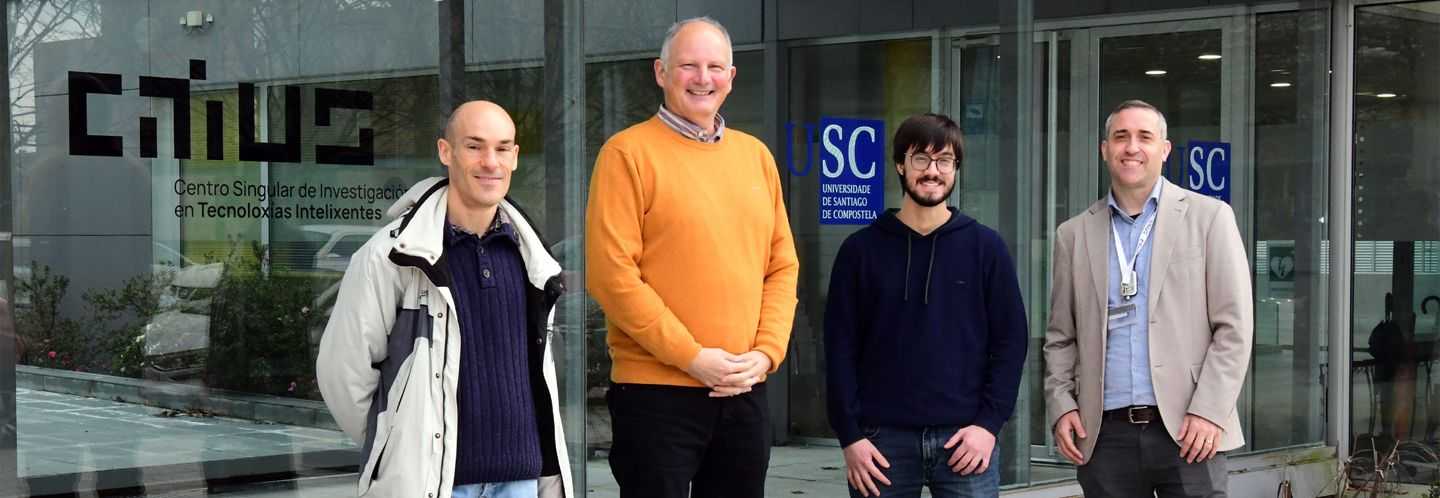
International podium for CiTIUS's explainable Artificial Intelligence
A team from the center achieves third place in the 'IEEE FLAME Technical Challenge 2024,' a global competition organized by the IEEE Computational Intelligence Society, which rewards innovative works aimed at combining language models with computational intelligence techniques, with the purpose of illuminating AI systems capable of generating reliable explanations.
A team of researchers from the Singular Research Center in Intelligent Technologies of the University of Santiago de Compostela (CiTIUS) has achieved third place in the international competition IEEE FLAME Technical Challenge 2024. This contest, promoted and organized by the prestigious scientific society IEEE Computational Intelligence Society, seeks innovative ideas that explore new strategies for combining large language models (such as those used in generative AI tools or LLMs) with advanced computational intelligence techniques; a branch of AI that proposes and designs intelligent models inspired by nature—particularly biology and human language—among which are artificial neural networks, evolutionary computation, and fuzzy logic.
The award-winning team, composed of José María Alonso, Pablo Miguel Pérez, Alejandro Catalá, and Alberto Bugarín, presented a project that addresses one of the biggest current challenges in AI: how to generate accurate and error-free explanations that are understandable to people. In this regard, one of the main challenges is avoiding the so-called "hallucinations" of generative AI models, a phenomenon where the generated responses seem reliable but actually contain incorrect or invented information.
The finalist project MAI-XAI-CiTIUS-USC combines the power of language models with fuzzy logic-based systems, an AI technique that allows machines to handle the imprecise language concepts such as "high," "low," or "approximately," which are essential in human communication.
Through logical rules, such as 'If something very similar to A is observed, then we can predict that something very similar to B will occur,' these systems transform the inherent subjectivity of human language into concrete numerical values, which gives models the ability of approximate reasoning (or common sense) and handling the imprecision of human language, improving their capacity to understand and respond to people in a natural and effective way. Moreover, the proposed architecture incorporates tools to retrieve relevant information from large databases and adapt responses to the specific context of each user.
A success linked to the XAI4SOC project
The awarded work is part of the research project XAI4SOC (Explainable Artificial Intelligence for Healthy Aging and Social Well-being), which develops advanced human-centered AI tools, with applications in vulnerable populations (such as the elderly at risk of dementia and adolescents). XAI4SOC seeks to create explainable algorithms that empower users and promote their physical, mental, and social well-being.
The presented solution combines LLMs with fuzzy logic, and thanks to a modular design, facilitates its adaptation to different contexts, becoming a useful tool in important sectors that demand clear and reliable AI-based explanations, such as healthcare or education.
Global recognition of Galician talent
In the evaluations carried out during the competition, the project stood out for its ability to significantly reduce errors in the responses generated by the models while producing compact and easy-to-understand explanations, avoiding the long narratives that often complicate the interpretation of generative AI systems. Additionally, the results demonstrated a high level of accuracy in the responses, comparable or superior to those of other proposed solutions.
The IEEE FLAME Technical Challenge, whose full name is Fusing Large lAnguage Models with computational intElligence, has attracted proposals worldwide in this edition, with only six reaching the final after a rigorous selection process. The work of the CiTIUS team (a center co-financed by the European Union through the Galicia Feder 2021-2027 Program), which achieved a third place, underscores the excellence of the research conducted in Galicia and strengthens the center's international projection. This recognition also highlights the importance of combining the experience of established researchers with the emerging talent of young researchers such as Pablo Miguel Pérez, a graduate in computer engineering and a student of the AI Master's program at USC, who actively contributed to the project through his participation in the XAI4SOC project.
The project, explained in detail in a video created specifically for the recently concluded contest, seeks to revolutionize the use of language models in critical contexts where explainability and reliability are essential, such as decision-making in healthcare, education, risk assessment in the financial sector, or legal data analysis in judicial processes, among others.